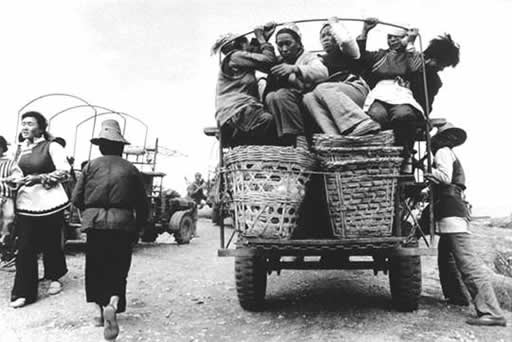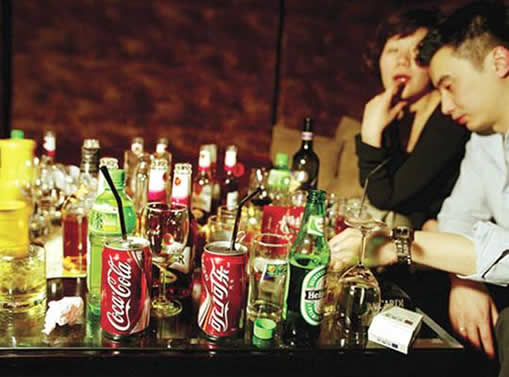For Immediate Release,
1/4/08
LH HORTON JR GALLERY presents
Mark Leong
China: Margins and Mainstream
Exhibition: January 17—February 13, 2008
Reception: January 17th, 5–7pm
Gallery Exhibition Hours
Tue- 11am–4pm, Wed–Th 11am–6:30pm, Fri-11am–1pm
Extended Saturday hours January 19th: 11am–3pm
Delta College’s LH Horton Jr. Gallery presents the work of award winning photographer, Mark Leong. China: Margins and Mainstream was inspired by the exhibition The Heaviness of Consumption, curated by the San Francisco Arts Commission Gallery in 2007. In this exhibit, Leong and several photographers from the Chinese Artist Network exhibited their photographs of China. Photographs from the SF Arts Commission exhibition, as well as from Leong’s book, China Obscura, will be presented at the Horton Gallery exhibit.
Mark Leong is a fifth-generation American-Chinese whose family emigrated from Guangdong Province to California over 100 years ago. After graduating from the Department of Visual and Environmental Studies at Harvard University in 1988, he was awarded a George Peabody Gardner Traveling Fellowship to spend a year taking photographs in China.
Arriving in China a day after the Tiananmen Square massacre, Mark Leong was uniquely placed to document the country's economic and social transformation as it embraced capitalism and abandoned its socialist ideals. His photographs show ordinary people seeking their place in a reconfigured society. They examine what changes and what remains the same as world's most populous country transforms into an economic powerhouse.
In 1992, Leong returned to China as an artist-in-residence at Beijing’s Central Academy of Fine Art. He subsequently decided to make his long-term home in Beijing.
In 2003, Leong joined the Redux Pictures photo agency. His photos have appeared in Time, Fortune, The New York Times, Business Week, The New Yorker, Stern, and National Geographic. He has received grants from the National Endowment of the Arts and the Fifty Crows International Fund for Documentary Photography. His book China Obscura won a special citation from the Overseas Press Club for photographic reporting in magazines and books in 2004.
Artist Statement::
I first came to China in 1989, the day after the Tiananmen crackdown. My idea was simply to photograph daily life, a ground-level record of a year in my ancestral homeland. With the democracy movement stamped out, I assumed that China would return to a state of isolation as the Communist Party reconsolidated control. I traveled the countryside by bus and train, taking pictures of farmers and schoolchildren, imagining that their lives would stay the same for years to come.
During my second year-long trip to China in 1992, I realized how wrong I had been. Deng Xiaoping had given his blessing to private enterprise, so instead of glum socialism, I encountered free-for-all capitalism in a nation trying to transform itself as fast as it could. In 1989, products like motorcycles and air conditioners were rare luxury that often had to be smuggled into the country. Three years later, however, these items were not only for sale, they also were being produced locally, along with, according to the labels, clothes, electronics, and sports gear—almost everything in the world.
I also didn't expect that more than a decade later, I would still be taking pictures in China, compelled by the surge of constant change. But while many of my assignments for Western publications have covered the colorful commercial explosion that has captured the world's attention, my personal photos have explored the darker realities outside media spotlight.
A sense of broken trust has come to define the relationship between China's citizens and its government, beginning with Tiananmen in 1989. With the shift toward capitalism in 1992, the Chinese people were left to fend for themselves in a new economy. Since then, China's gains toward economic superpower status have also been marked by loss—of paternalism, of ideology, of guaranteed welfare. Meanwhile, the Communist Party retains its monopoly of political power, and the gap between burgeoning free markets and stagnating personal freedoms continues to widen.
This project documents the lives of ordinary individuals as they attempt to navigate this altered landscape. In the mayhem of economic growth, some have found new opportunities while others have been further marginalized, herded out of their homes or made into commodity laborers in the name of progress. The old Communist Party, which dominated every aspect of Chinese life for half a century—no longer exists. The ideological and spiritual
void left in its place is palpable at all levels of society, as people search, and wait, for something to fill it.
-Mark Leong
The LH Horton Jr. Gallery is the visual arts venue of the Delta Center for the Arts at San Joaquin Delta College. The primary mission of the Gallery is to promote quality and culturally diverse artwork in support of our students’ education and community at large.
The Gallery is located on the ground floor of the Shima Center at San Joaquin Delta College, 5151 Pacific Ave, Stockton. Admission is free to the public and wheelchair accessible. Group Tours are welcome, and Gallery Talks can be arranged.
For more information, please contact LH Horton Gallery Director, Jan Marlese at:
(209) 954-5507 or jmarlese@deltacollege.edu.


Mark Leong Digital Images Available on Request
###